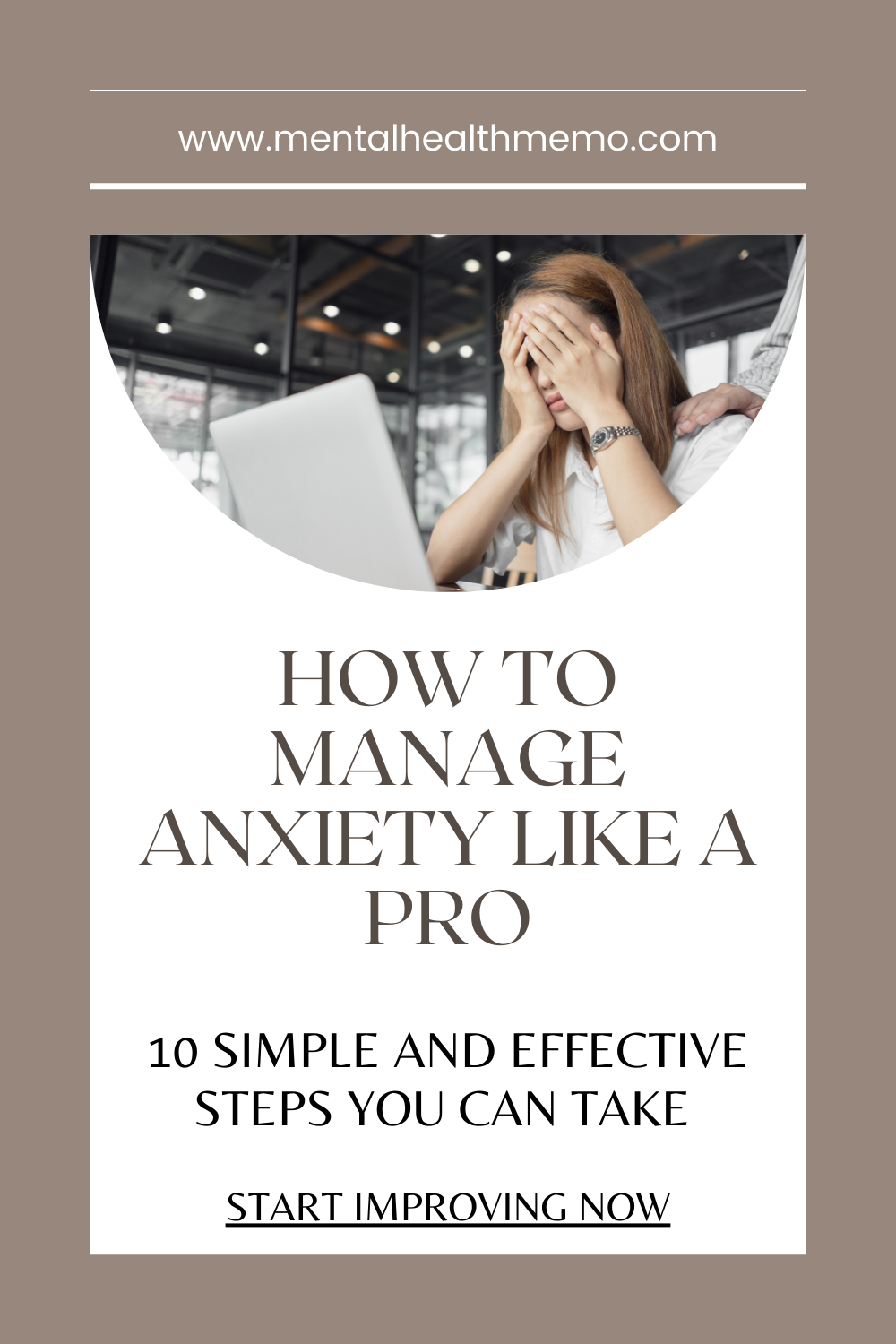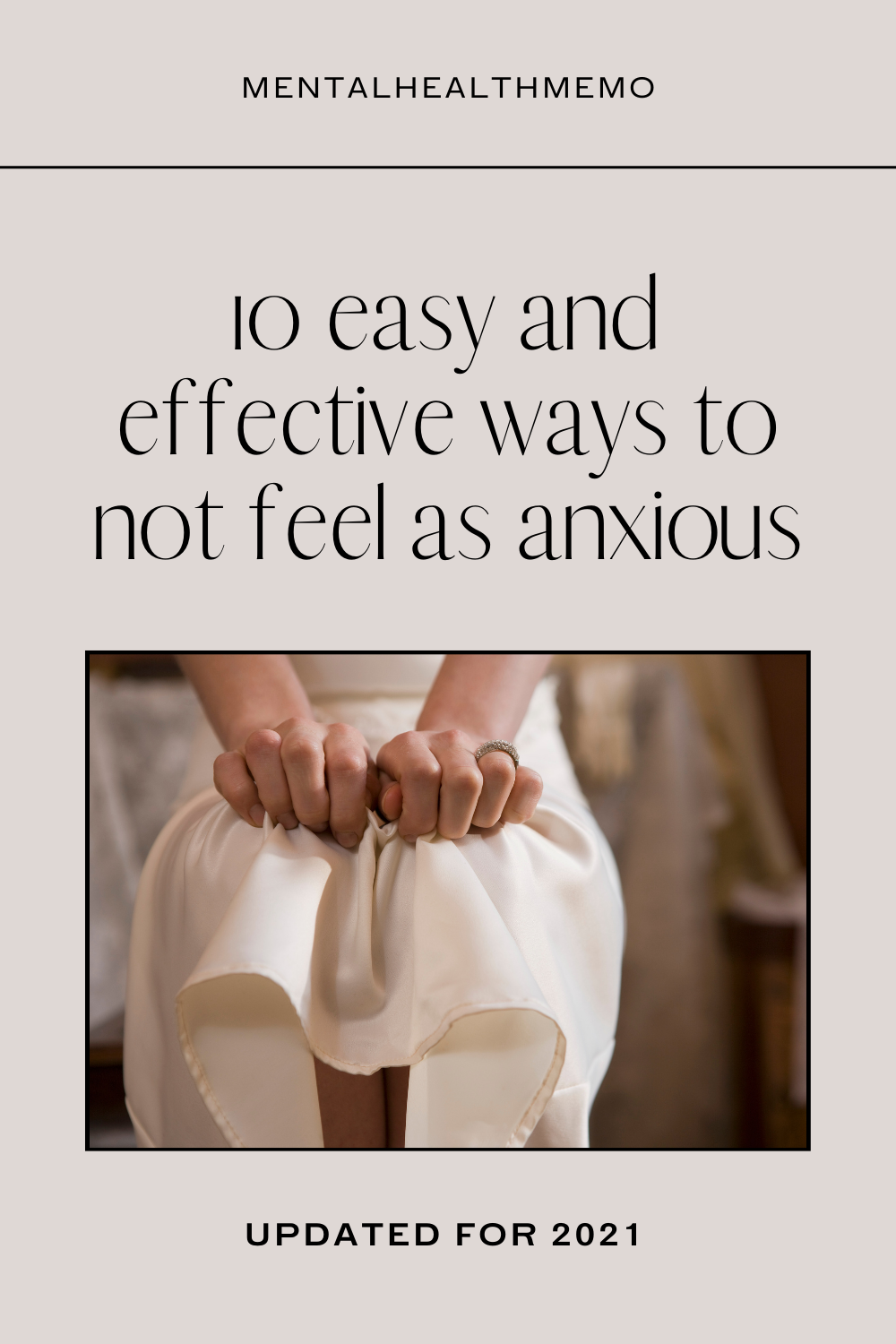Precursor
The mental health memo of the day is: if you’ve been struggling with anxiety and have no idea how to manage it so you can participate in life normally again, I’ve got you with today’s post!
Anxiety can be incredibly debilitating regardless of how long you’ve had it for or how severe it is.
I’ve had anxiety disorders since I was little and so I’ve gone through a lot of therapy over the years. Thanks to that, I have learned how to manage anxiety in the most effective ways possible. The experience has also made me well acquainted with the diversity of anxiety symptoms, thought patterns, and behaviors.
Managing anxiety does not mean that it’ll necessarily 100% go away (unless you have acute and low levels of anxiety), but it will certainly make living with it a bit easier. This includes being able to cope when severe anxiety creeps in, keeping it at bay most of the time, finding ways to let anxiety out, and learning what can worsen it.
The good news is that there are a lot of things you can try to help manage anxiety! This list doesn’t even cover all of it, but it’s certainly a start. So let’s jump right into it because we have lots to cover!

What is anxiety and how does it feel?
You might be wondering what anxiety is and whether anxiety is even what you’re currently experiencing, and that’s understandable. While there is a pretty solid definition of anxiety, that doesn’t mean everyone feels it exactly the same which is why you may be feeling unsure.
So before we get into how to manage anxiety, let’s first understand what it is and its symptoms.
Here is a direct quote from the American Psychological Association about what anxiety is:
“Anxiety is an emotion characterized by feelings of tension, worried thoughts, and physical changes like increased blood pressure. People with anxiety disorders usually have recurring intrusive thoughts or concerns. They may avoid certain situations out of worry. They may also have physical symptoms such as sweating, trembling, dizziness, or a rapid heartbeat.”
This definition gives a pretty broad picture as to what anxiety feels like and some of the common physical sensations. The core principles of anxiety really are the worried (and often unrealistic and intrusive) thoughts, followed by behaviors done to soothe the worry (anything from avoidance to self-medication to relaxing techniques), and finally physical symptoms (like a racing heart, chronic stomachaches, chronic fatigue and soreness, migraines, sweating, etc).
There is also a variety of anxiety disorders that exist so if you’re unfamiliar with them feel free to read all about this topic on my posts here and here!
And while online resources are helpful, if you’re truly unsure about what you’re feeling please seek out professional help in the form of a doctor, psychologist, psychiatrist, social worker, or therapist because they will be able to work with you specifically on what it is you’re experiencing.
How to Manage Anxiety:
1. Eating well
This might seem a bit strange because you might not think food has a relation to anxiety, but it does! Aside from keeping you physically healthy, a good diet can actually help manage anxiety.
It’s not super complicated. Obviously, you have to eat well-balanced meals to ensure you are getting all your nutrients. But the two biggest things I want to emphasize are:
1. Stay away from caffeine
Caffeine can mimic symptoms of anxiety or a panic attack and can therefore make your overall anxiety worse.
I’m sure you know exactly the symptoms I’m talking about. That jittery, absent-minded, on-edge feeling you get after you’ve had some coffee? Those are normal sensations for caffeine absorption but are not going to help you out in the anxiety department.
Feeling this way can worsen your already present anxiety which could lead to a panic attack or just severe anxiety throughout the day. If you’re not already anxious, it could trigger anxiety due to its similar symptoms.
This is actually a big reason why I don’t drink coffee and keep any caffeine from teas or chocolate to a minimum. I’ve always gotten a panic attack after every coffee I’ve ever had, so I just don’t drink any.
If you suffer from anxiety or panic attacks, I strongly recommend you do the same.

2.Eat a lot of foods that will give you energy
Since you’re not getting any caffeine you need to make sure you’re eating lots of foods that give you energy. The reason energy-boosting foods are so important for those with anxiety is that is we don’t realize just how taxing it is to be anxious all the time.
For me, after I have a panic attack I usually fall asleep for extended periods of time because my body is so drained from the severity of anxiety I experienced.
But even without a panic attack, constantly being anxious takes so much of your energy. Not only that, but with anxiety, you may also experience sleep deprivation. This all leads to severe fatigue, which is why it’s so important you eat energy-boosting foods and stay away from caffeine.
Some foods to help give you an energy boost are:
- Protein (fish, chicken, edamame, tofu),
- Bananas
- Green tea (if you still really need some caffeine)
- Complex carbs (whole wheat bread, brown rice)
- Additional supplements if you’re not able to meet your daily nutrient intake
2. Exercise
I previously wrote an article on why exercise is essential for mental health that goes very into detail so I’ll only briefly go over it on this post. Exercise helps:
- You to get excess stress and frustrations out. This can be particularly helpful if you have anxiety keeping you up at night or you’re restless
- Boost your mood through Endorphins
- You to feel accomplished
- Keep your body healthy which in turn helps your mind stay healthy
- Act as exposure therapy for panic attacks
If you’ve been struggling to make exercise a habit, I strongly recommend you read my post about how I managed to exercise every day for over a year (as a person that hates exercise and struggles with chronic conditions)!
I know starting can seem daunting and it’s always the hardest part, but once you get into the habit of it and find the types of exercise you enjoy, it’ll make a HUGE difference to your general wellbeing and life.
3. Have a Planner
If not a planner, at the very least, be organized and have a general plan for your days.
Being organized and prepared can help eliminate so many small anxiety-inducing things. Having this type of control can help you manage anxiety better as you feel less lost, chaotic, and confused about what’s next. For example:
- Having your clothes and meals ready in advance helps you to not rush in the mornings. This in turn helps prevent you from running late which can be anxiety-inducing. On top of that, it can create smooth running mornings which can ease morning anxiety
- Knowing when you have an anxiety-inducing event coming up helps you to prepare for it
- Carving out times to exercise or partake in self-care. Both these things are vital for managing anxiety
- Setting alarms on your phone to remind you to take a break, drink water, eat a meal, or just take some time to yourself. This one is really helpful for me because I can lose track of time so easily and often forget to take care of myself which worsens my anxiety.
Of course, everyone is different in how much of a planner they are, but I find that the more prepared and organized I am, the calmer I am. Because I know what my day or week or month will consist of and so I’m ready for it.
4. Partake in Hobbies
Doing things that make you happy and/or help you to improve a skill can be incredibly de-stressing.
This doesn’t have to be paying a lot of money to go to pottery class every week or spending a lot of money on expensive equipment so you can become the next greatest baker, but it definitely can be. You can pick whatever suits your interests and budget and go from there.
Personally, as a student, I don’t have money to be throwing around (as much as I want to join that pottery class). So my hobbies are reading borrowed books from the library, painting with cheap paint, walking in parks, and exercising.
Now in my ideal world I’d be joining clubs and signing up for classes, but that’s not my reality. And similarly, for you, do what is available and possible in your world.
There are a few reasons why hobbies are so great for managing anxiety.
- Depending on your hobby you can find a community to be part of. Social support is really important and it’s something I’ll be talking about shortly. But in general, having a community can help you to stick to the hobby, and make you feel supported.
- They allow you to grow and achieve success in something, which can make a huge impact on your self-esteem and general mood.
- Hobbies often require your full attention. This gives your mind a break from constantly overthinking, panicking, and being anxious. This can help you cultivate a more grounded and calm state of mind. At least during your activity.
- You get to loosen up and have fun! Being anxious all the time can wind you up pretty tight. So getting to have fun is so important!

Participating in hobbies can help to alleviate anxiety and promote happiness and growth
5. Sleeping Enough
Of course, this is easier said than done, especially for those who also have sleeping problems due to their anxiety. But the damage of not sleeping well is evident.
Whether it’s being slower than normal and ending up late for things, using caffeine to cure fatigue, being jittery and out of it, or any other variation of this. The end result is anxiety due to lack of sleep.
That’s why it’s so important to be getting a good amount of sleep if you want to manage your anxiety better.
I think it’s also very important to note that despite the whole “8 hours of sleep” obsession, everyone needs a different amount of sleep.
So maybe you only need 5 hours of sleep, or maybe you need 10. Everyone is different so take responsibility for your health and make sure you get enough!
To help you achieve better sleep, you can try:
- Journaling before bed to get your thoughts all out so you can sleep instead of overthinking all night
- Using a weighted blanket
- Doing some gentle yoga to help your body and mind unwind
- Creating a zen room environment to help you feel calmer
- Having a morning routine and nighttime routine so you can transition from sleep to life and from life to sleep efficiently
6. A Support System You Can be Honest With
Having a good support system that you can confide in and be honest with is absolutely essential. Humans are pack animals so that means we thrive and are happier in groups.
Of course, that doesn’t mean you can’t be introverted, but it does mean that having people to love and support you is necessary.
Even simply having a professional you can speak to about your mental health is sufficient.
The important part is that you can honestly share how you feel so that you can either be given support or guidance. Advice from other people can be really helpful when we’re lost in our world of anxiety.
Not only that but if you’re close enough with your support system they can potentially help calm you down during panic attacks. Or even simply help you to de-stress a bit during hard times.
However. I would like to note that not everyone is lucky enough to have this kind of support. And if that’s you, I would really recommend reaching out to either a professional or to communities you are part of because human connection is incredibly important.
7. Regularly Trying New Things
When we try new things, we put ourselves in a new, unfamiliar and uncomfortable situation.
The reason this is so important is it helps expose you to anxiety-inducing circumstances that you can overcome. By overcoming these situations, you start to feel more confident and more comfortable with feeling anxious.
It’s a little bit like exposure therapy, but not as intense.
The whole idea is to have fun so that it’s not additional stress but rather a way to manage anxiety.
And again, these don’t have to be big things. It can be something as simple as ordering something new off the menu.
But the point is to prevent you from getting too comfortable in your routine so that you can get a stronger resistance to anxiety and therefore manage it better.

8. Journaling
I’ve written multiple posts about guided journals for specific needs because I think journaling is so important for mental health. For your reference, here are all of them:
Best guided journals for anxiety
Best guided journals for productivity
Best guided journals for any occasion and goal
I also have a free journal you can sign up for below!
Like planning, it can act as a tool to keep track of yourself and your health. This is super helpful if you’re ever feeling off and wondering why because you can just refer to your journal and see if anything happened recently that could have triggered how you’re feeling!
Additionally, it can act as a hobby, a way to de-stress, self-care, a way to practice mindfulness, a creative outlet, and much more.
It also really helps you to reflect and evaluate yourself and how your anxiety is interacting with what’s going on around you.
This type of insight is so beneficial when trying to manage anxiety because it helps you to understand what’s wrong and maybe how to fix it too.
There are just so many benefits to journaling and regardless of the type of journaling you do, it’ll help you.
9. No Recreational Drugs or Alcohol
Some of y’all are really gonna be against this one but I think it’s also important to note.
I know some people use certain drugs to actually ease their anxiety, and that’s fine. I’m not here to judge anyone.
But in general, recreational drugs and alcohol TEND to worsen anxiety. Like caffeine, they can mimic symptoms of anxiety or simply create feelings of anxiety out of nowhere.
Not only that, but it’s much harder to rationalize anxiety and a panic attack when you’re intoxicated and not in a good state of mind.
Personally, I have heard many stories of people who have had bad trips and ended up with anxiety without having had it before (and it’s actually a real disorder: Substance/Medication Induced Anxiety Disorder)!
So while I’m not going to tell anyone what they should and shouldn’t do, I would just recommend reconsidering using drugs and alcohol if you want to manage anxiety better.
10. Practicing Mindfulness
This can be done via yoga, meditation, mindfulness techniques, or simply trying to make yourself more aware and in tune with things around you.
I think this helps a lot because it puts things into a new perspective.
Ever since becoming more mindful, I’ve stopped being anxious and stressing about trivial things because I realized their insignificance. I have also become more in tune with my body and mind, and what seems to make them upset.
Specifically for anxiety, I would also recommend staying present and letting yourself feel your anxiety. By letting it play out and not running away from it or trying to stop it, you get a stronger tolerance for it.
This was actually the final step of exposure therapy I had to do because every time I got anxious I would whip out the distractions and try to make it go away. But by feeling it out I’ve gotten more comfortable with the feeling of anxiety and I feel like I have better control of it now.
It’s still super duper hard for me to do even now and I often can’t last too long. But I’ve only gotten better and it has helped me to feel like I can manage anxiety better.

In Summary
Trying to figure out how to manage anxiety can be really challenging. It’s something I still haven’t perfected after a whole lifetime of having anxiety disorders.
But I have found these 10 things to have helped me get more in control, and I hope they do the same for you.
Let me know in the comments some of your top tips for managing anxiety!
All my love,
T


Great advice! Really helpful techniques.
Thank you so much! I’m really glad you found them helpful!